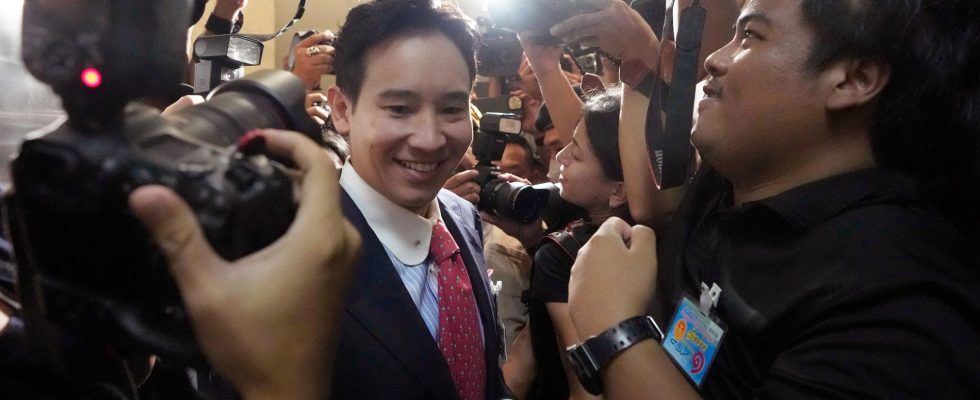1 / 3Photo: Sakchai Lalit/AP/TT
Thailand will have a new prime minister, but it will not necessarily be the big winner of the election.
The system is rigged in the military’s favor and as recently as yesterday, the democratic opposition leader was accused of several crimes.
– I believe in myself and that I will work to the best of my ability to meet the people’s expectations and the support they have given me, Pita Limjaroenrat told a gathering of media when he arrived at the National Assembly in Bangkok on Thursday morning.
He won a landslide victory in Thai elections in May, rallying a broad and more democratically oriented coalition opposed to the military’s great power.
But a clear majority in number of votes does not mean that a shift in power is a given, in a system that has been designed according to the will of the military-backed establishment.
When parliamentarians gather to appoint a new prime minister on Thursday, a number of hurdles remain for Limjaroenrat.
All senators elected
In the lower house of the National Assembly, the House of Representatives, Pita Limjaroenrat’s party Forward is the largest party. Together with its seven partner parties, it gathers a substantial majority (312 out of 500 mandates).
– This is a party that leads a coalition and they have won the election, says Thitinan Pongsudhirak, a political scientist at Chulalongkorn University in Bangkok.
– In most other countries they had been in power by now.
However, the upper house, the Senate, is appointed entirely by the military in accordance with the constitution drawn up after the military coup in Thailand in 2014. The number of senators is 250.
A new prime minister needs the support of a majority when both chambers vote – that is, at least 376 votes. As the system has been regulated in this way, Pita Limjaroenrat lacks 64 votes to be able to win.
– I will do my best to present my vision and answer all the senators’ doubts, says Limjaroenrat himself before the meeting.
Offense of majesty
On Wednesday, the day before the big vote, Thai authorities cast further doubt on Pita Limjaroenrat. He was charged with crimes in two cases, which could have consequences for his political work.
In one case, he is accused of violating the country’s election campaign rules, which state that a political candidate cannot have any ownership stake in media companies. This Pita Limjaroenrat has had in a television company, but he emphasizes that it has not been active for many years and that he took it over as a kind of bankruptcy estate from his father.
The Electoral Commission has taken the matter to the judiciary with a recommendation that Limjaroenrat be suspended from the National Assembly.
In the second case, he is accused of wanting to overthrow Thailand’s highly regarded and protected monarchy. The Forward party went to the election on, among other things, changing the country’s strict majesty laws, where the slightest insult directed at the royal family can lead to harsh punishments.
This very accusation can weigh particularly heavily when it comes to convincing opponents on the other side of the parliament.
That the accusations are brought forward in this way is a pure abuse of power, according to the party leadership in Framåt.
The coup leader resigned
The National Assembly will vote on the position of prime minister at 12 noon Swedish time. No other parties have come forward with a candidate, so if Pita Limjaroenrat is not elected, it could be a long process.
Last Tuesday, Prayut Chan-o-cha resigned as prime minister. The former army chief, who was behind the military coup in 2014 and then became prime minister, said he was leaving politics completely after the election defeat.
